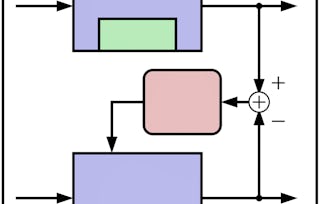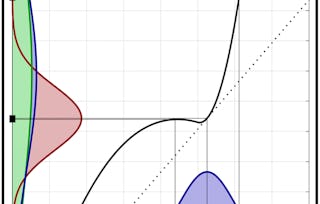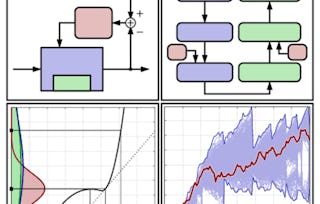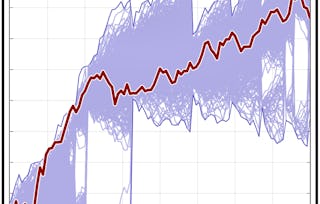As a follow-on course to "Kalman Filter Boot Camp", this course derives the steps of the linear Kalman filter to give understanding regarding how to adjust the method to applications that violate the standard assumptions. Applies this understanding to enhancing the robustness of the filter and to extend to applications including prediction and smoothing. Shows how to implement a target-tracking application in Octave code using an interacting multiple-model Kalman filter.

Linear Kalman Filter Deep Dive (and Target Tracking)
Ends soon: Gain next-level skills with Coursera Plus for $199 (regularly $399). Save now.

Linear Kalman Filter Deep Dive (and Target Tracking)
This course is part of Applied Kalman Filtering Specialization

Instructor: Gregory Plett
Included with
Recommended experience
Skills you'll gain
Details to know

Add to your LinkedIn profile
26 assignments
See how employees at top companies are mastering in-demand skills

Build your subject-matter expertise
- Learn new concepts from industry experts
- Gain a foundational understanding of a subject or tool
- Develop job-relevant skills with hands-on projects
- Earn a shareable career certificate

There are 4 modules in this course
Knowing how to derive the steps of the Kalman filter is important for understanding the assumptions that are made and to be able to re-derive the steps for different assumptions. This week, you will learn how to derive the steps and will gain insight into how the Kalman filter works.
What's included
7 videos12 readings6 assignments1 discussion prompt
Last week, you learned the assumptions made when deriving the Kalman filter. What if these assumptions are not met correctly? What if numeric roundoff error causes failure? This week, you will learn how to solve problems with the standard Kalman filter.
What's included
7 videos7 readings7 assignments3 ungraded labs
The standard linear Kalman filter works well for state estimation, but can be extended to implement prediction and smoothing as well. Further, we can speed up the steps or even eliminate steps in some circumstances. This week, you will learn some extensions and refinements to linear Kalman filters.
What's included
7 videos7 readings7 assignments3 ungraded labs
A popular application of Kalman filters is to track (usually non-cooperating) targets. This week, you will learn how to implement standard and specialized Kalman filters suited for target tracking.
What's included
6 videos6 readings6 assignments2 ungraded labs
Earn a career certificate
Add this credential to your LinkedIn profile, resume, or CV. Share it on social media and in your performance review.
Instructor

Offered by
Explore more from Electrical Engineering
 Status: Free Trial
Status: Free TrialUniversity of Colorado System
 Status: Free Trial
Status: Free TrialUniversity of Colorado System
 Status: Free Trial
Status: Free TrialUniversity of Colorado System
 Status: Free Trial
Status: Free TrialUniversity of Colorado System
Why people choose Coursera for their career





Open new doors with Coursera Plus
Unlimited access to 10,000+ world-class courses, hands-on projects, and job-ready certificate programs - all included in your subscription
Advance your career with an online degree
Earn a degree from world-class universities - 100% online
Join over 3,400 global companies that choose Coursera for Business
Upskill your employees to excel in the digital economy
Frequently asked questions
To access the course materials, assignments and to earn a Certificate, you will need to purchase the Certificate experience when you enroll in a course. You can try a Free Trial instead, or apply for Financial Aid. The course may offer 'Full Course, No Certificate' instead. This option lets you see all course materials, submit required assessments, and get a final grade. This also means that you will not be able to purchase a Certificate experience.
When you enroll in the course, you get access to all of the courses in the Specialization, and you earn a certificate when you complete the work. Your electronic Certificate will be added to your Accomplishments page - from there, you can print your Certificate or add it to your LinkedIn profile.
Yes. In select learning programs, you can apply for financial aid or a scholarship if you can’t afford the enrollment fee. If fin aid or scholarship is available for your learning program selection, you’ll find a link to apply on the description page.
More questions
Financial aid available,

